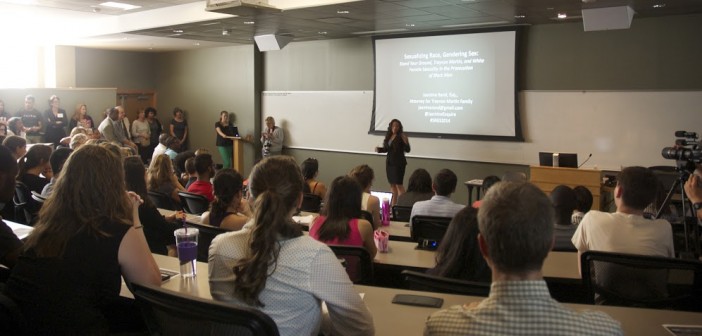Jasmine Rand, the attorney for Trayvon Martin’s family in the State of Florida v. George Zimmerman trial, spoke at Lehigh on Thursday in a lecture called “Sexualizing Race, Gendering Sex.”
Trayvon Martin was a young African-American man walking home from a 7-Eleven in Sanford, Fla., late at night while wearing a hoodie and holding a package of Skittles. George Zimmerman, the neighborhood watch coordinator for Martin’s gated community, shot him for “looking suspicious.”
Throughout the trial that followed the incident, the phrase “I am Trayvon Martin” was used to generate support for the victim.
“That phrase, it was born on a campus,” Rand told the Lehigh students in the audience.
One of Rand’s main focuses throughout the discussion was the impact that students have on the world. Rand was a professor at the time she was called upon to work on the case, and it was her students who coined the “I am Trayvon Martin” phrase.
“She was inspirational in a sense,” Paul Lyons, ’16, said. “She definitely wanted us to think as students. She spoke not as an attorney, but as a professor and a human being. She inspired us to keep thinking and use our voices and to have passion.”
Rand began the presentation by noting certain historical cases regarding “Sexualizing Race and Gendering Sex” to help the audience comprehend how far, or how little, America has come on such issues. She began by discussing lynching, saying, “lynching is not possible without sexualizing race.” For example, she said the majority of those who suffered from lynching were black men who were falsely accused of raping white women.
“Black men’s sexuality was a scapegoat for racializing and taking the black male life,” Rand said.
Just before the jury announced the verdict for the Zimmerman trial, Rand had assured Sybrina Fulton, Trayvon’s mother, that they were likely to win the case. She said having a predominantly white female jury would ensure that they sympathized with Fulton as being a mother who unjustly lost her son.
When they lost the case, Rand said she couldn’t help but think: “Does our history have something to do with it? A history that took the sexuality of white women and pitted them as a victim against black men? Is the reason (the jury) couldn’t identify with themselves as a mother of Trayvon because they saw themselves as a victim of Trayvon?”
Overall, Rand’s main objective was for the students in the audience to understand that they have the capability to ignite social change.
“Leadership is about service,” Rand said. “It’s about humbling yourself to the cause. I had to learn it’s not about me. You cannot place your success on the outcome. Success is when every time life hands you failure (…) you stand up with the same strength and continue to fight for what is right and what is justice.”
Madeleine Centrella, ’18, looked to Rand as an inspiration.
“The ultimate dream for me would be to travel to countries that want to change and develop more democratic legal systems (…) and that’s exactly what Rand did,” she said. “I was really inspired by that because that’s my dream. With everything she’s done, she really ignited a movement. It’s really incredible.”
Rand plans to continue advocating for racial equality and social justice in her future work. She recently began a campaign called “I AM the change.” The goal of the campaign is to apply Trayvon Martin’s identity to multiple cases around the world, she said.






Comment policy
Comments posted to The Brown and White website are reviewed by a moderator before being approved. Incendiary speech or harassing language, including comments targeted at individuals, may be deemed unacceptable and not published. Spam and other soliciting will also be declined.
The Brown and White also reserves the right to not publish entirely anonymous comments.